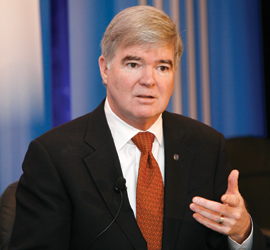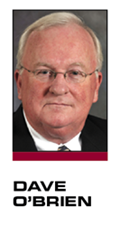With the academic year closed and universities across the country conducting commencement ceremonies, it is a good time to reflect on the past year and consider the future. We have to conclude that college athletics has had a pretty tough year in many respects. And yet, the future has never been brighter in so many ways.
Big-time athletic programs committed serious rules violations. The University of Southern California, the University of North Carolina and the University of Miami found themselves mired in NCAA investigations and/or sanctions. Sexual abuse scandals rocked Penn State and Syracuse and will continue to do so through the summer.
Student-athlete rights legislation that allowed multiyear scholarships barely passed. The miscellaneous expense legislation that would have allowed student athletes to receive an extra $2,000 is still under review. Transfer rules came under scrutiny, and schools did not distinguish themselves in their application. During this year’s 40th anniversary of Title IX, most schools are still not in compliance with the law.
Conference realignment revealed the unbridled lust for money as college presidents sought greener pastures. Lawsuits flew in every direction, with schools demeaning themselves with mean-spirited, convoluted and illogical complaints against former conferences. Self-serving actions ruled.
Although it appears tantalizingly close, a football playoff still hasn’t happened, with the BCS representing a closed club to many schools and sports fans, not to mention an antitrust violation. Even when a playoff emerges, the revenue distribution methodology will continue the bifurcation between the haves and have-nots.
Yet amid of all of this activity, college sports television rights have gone through the roof. The explosion of media rights has nothing to do with the marketing brilliance of college sports programs or the marketing wizardry of the NCAA. Simply put, an increased number of media outlets and new media platforms for monetizing popular content have served as a College Sports ATM. What college sports leaders resolve to do with this largesse will determine the success and popularity of the game moving forward.
 |
NCAA President Mark Emmert must continue to use the power of his office to push reform.
Photo by: SHANA WITTENWYLER
|
NCAA President Mark Emmert took office at a momentous time and he has been trying to navigate the organization through a maze of opportunities and challenges. Some of his attempts have been right on the money. At other times, he has sat on the sidelines as conference commissioners, college presidents and athletic directors acted with only their institutions’ vested self-interests in mind.
In trying to forge progress, Emmert faces incredible obstacles — including his relative lack of power. However, he does have the bully pulpit of his presidency available to him and he needs to continue to use it.
In the spirit of contributing to the discussion about how college sports can be conducted legally, equitably, fairly and profitably, here are 10 suggestions for reform. Some of them are already in the pipeline of change; others need to be discussed more thoroughly.
1. In virtually every sport, reduce the number of games that can be played in a season and limit the number that can be played during the school week. Student athletes are simply missing too much class time, which hurts academic progress and graduation rates.
2. Eliminate freshman eligibility for all student athletes who are considered special admits — and define that term as any student athlete who would not have been admitted to the institution but for the fact that they were athletes. If you are not academically prepared, you need a one-year period to acclimate to college life and the academic workload.
3. Connect postseason eligibility and both NCAA and conference revenue distribution with academic/graduation success and rules compliance. Simply put, succeed academically and play within the rules or incur immediate competitive and financial penalties.
4. Allow a full athletic scholarship to cover the full cost of attendance as defined by each school. There is no need to set a national limit since the schools already define what that amount is given their geographical location and academic offerings.
5. Stop the permanent misappropriation of the images and likenesses of student athletes. Simple economic fairness demands that compensation should be paid to student athletes for the commercial use of their images once their college playing careers are over.
6. Provide college athletes with the opportunity to enter into contracts to pursue marketing and endorsement opportunities while in college. Why can students with music scholarships earn money playing professionally for the local symphony but athletes cannot earn money off of their skill or reputation while in college?
7. Provide student athletes with the opportunity to engage agents/attorneys as they assess professional sports opportunities. Lucrative financial opportunities come across seldom in life. Professional advice is critically important to navigate opportunities.
8. Simplify the rule book. Major violations need to be limited to ethical misconduct on topics such as academic integrity, but punishments must be swift and substantive — including financial penalties and postseason ineligibility. The current rule book is indecipherable to just about every athletic administrator and coach.
9. Limit institutional athletic spending to some multiple of the amount the institution academically spends per student. There is no reason that athletic profits shouldn’t be spent on institutional priorities other than athletics. This constraint would be a way to slow the arms race and allow the institution to benefit from the media money being spent in college sports.
10. On the 40th anniversary of Title IX, it is unfathomable that so many institutions are out of compliance with Title IX. Only the combination of a lack of investigative resources on the part of the Office for Civil Rights and the good fortune of not being sued allows most schools to lay false claim to being in compliance with the law. The NCAA must commit to the public review and assessment of every institution’s compliance effort with the law.
Dave O’Brien (dpo32@drexel.edu) is an associate teaching professor and sport management program director at Drexel University, and is editor of CollegeSportsBusinessNews.com. He is a former Division I athletic director at Long Beach State, Temple University and Northeastern University.





